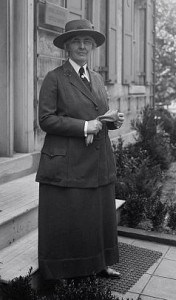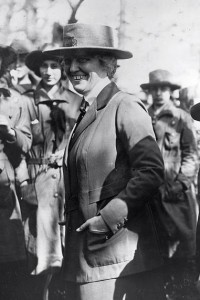Juliette Gordon Low called Lou Henry Hoover “an oak in a flower pot.” Some of you astute readers will know that this evocative phrase is Emily Bronte’s, from her 1847 novel Wuthering Heights. Bronte suggested that an oak could never thrive in the “shallow soil” of the flower pot.
“When I think,” Juliette wrote of Lou Hoover, “what splendid, definite work she has done for Scouts–The funds she has collected, the practical common sense she has shown, I realize what big things she can do, and I regret that she should be planted in the small circle of the Executive Committee like an oak in a flower pot.” (1)
Lou Henry Hoover was a geologist by training, an exceptionally intelligent and talented woman, and, in 1925, when Juliette wrote that letter, Hoover was also the immediate past president of the Girl Scouts. She had been elected in 1922 and had stepped down into the Executive Committee in 1925. As president, Lou Hoover had taken steps to professionalize the Girl Scouts, particularly at the level of top leadership. This shift from a national, volunteer staff to one with more paid positions was controversial. Even Lou Hoover understood that. She wrote to a friend, “to have a professional person come in to do the work makes it easy, but lessens the feeling of personal responsibility.” (2)
Juliette Low was sympathetic to both points of view. She saw the importance of paid leaders, at the national level particularly, because Girl Scouting had grown so rapidly during World War I. Still, she grieved the loss of what had been when Girl Scouting was run by a passionate and dedicated circle of women linked through long friendship.
The letter about Lou Hoover was written by Juliette Low to the then-current president, Sara Louise Arnold. Arnold came to the Girl Scouts from a career in higher education, and Juliette Low thought the world of her. Juliette Low was pleased to have Sara Arnold at the helm in part because she believed Sara would move more slowly toward the establishment of the necessary bureaucracy. That is why she continued her letter about Lou Henry Hoover like this:
“My one consoling thought is, that you [Sara] are the gardener, and you will bring out all that is best in her leaves and branches, but its the roots and what grows deep down, that need attention, otherwise if not pruned they may break up the flower pot.” (3)
The early 1920s was a momentous and a contentious period for Girl Scouting. Juliette Low learned to let go of the day-to-day decisions as her organization took on a life of its own. Still, this letter demonstrates one of the traits that made her so exceptionally good at what she did. Juliette Low, for all of her quirkiness, understood people. She knew their strengths—sometimes even when they didn’t. She was alert to the moments when pride, shortsightedness, and meanness of spirit would push out loving kindness and compassion in decision-making. And even when she had to back away from daily management in 1920, she used her role as Founder judiciously, sensing that her words carried extra weight. Suggesting to President Arnold that she treat former President Hoover carefully and kindly, to encourage rather than alienate her—both for her good and the good of the organization—was characteristic of Juliette Low’s approach to personnel management and to friendship.
As First Lady of the United States, from 1929 to 1933, Lou Henry Hoover would be a true and visible supporter in her role of Honorary President of the Girl Scouts. And, in 1935, she would ascend a second time to the national presidency of the Girl Scouts. Lou Henry Hoover, that mighty oak, found the deep soil she needed to thrive in Girl Scouting.
More on the 1920 transition in next Friday’s blog.
_______
(1) Juliette Gordon Low to Sara Louise Arnold, 25 May 1925, Juliette Gordon Low Papers, Box 10F2a, National Historic Preservation Center, Girl Scouts of the USA, New York, New York.
(2) Tammy M. Proctor, Scouting for Girls: A Century of Girl Guides and Girl Scouts (Santa Barbara: Praeger Press, 2009), 40.
(3) Low to Arnold, 25 May 1925.
Photos of Lou Henry Hoover from the Library of Congress.




Marlo told me about your book and your blog. What wonderful projects — congratulations. Of course, Lou Hoover was an Iowan. If you have not visited the presidential museum in West Branch, I think it is worth a trip. (I once had a student whose father had been the curator there, and my student wrote a descriptive essay of the public and behind-the-scenes areas of the museum, which had been his playground.) I will be reading more.
Hi, Monie–Thanks for reading and for your comment. As you know, the Hoover Presidential Library is my nearest presidential library and I have, in fact, done research there. They have a top-flight group of archivists! Lou Henry Hoover and Juliette Low were not bosom buddies, so Hoover did not figure prominently in my book—but there are articles to be written! Thanks again!